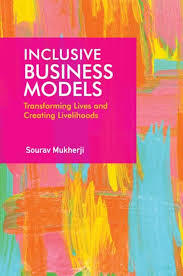My verdict - If you are someone who is even remotely interested in inclusive business models, please do read this book.
"The session by Prof. Sourav Mukherji on inclusive business models was my highlight," shared Vishnu, my co-founder at CoolCoach Academy. He was attending an incubation bootcamp at IIM Bangalore through NSRCEL. In our application to NSRCEL, we stated that we have our impact model sorted but needed help to figure out our business model. The way Vishnu described Prof. Sourav's session, it was clear that his feedback would be invaluable to us.

Prof. Sourav, an avid runner, was intrigued by CoolCoach's vision and model, and agreed to meet us. I was curious to know how he got interested in this area and he talked about being inspired by Harish Hande, the founder of SELCO, a senior of his from his engineering days. I have the fondest memories of meeting Harish in 2006. I had just joined RIN (short for Rural Innovations Network and better known as Villgro now after their rebrand) and he was on the board. I was about to head out to rural areas to do market research for some of the innovations incubated at RIN and Harish advised me to find and meet the local bank managers. Harish believed that they were the best sources of information.
Prof. Sourav was generous with his time and very incisive with his feedback. He could see the potential of our model, but he also warned us of the pitfalls of achieving social impact using enterprise principles. He is one of the few people I know who understands the potential of an inclusive business model but is also open to admitting that he doesn't know of any model that has been immensely successful. He did not mince words for us either. He wished us well but cautioned us that building an inclusive business model is far harder than building a traditional non-profit.
As part of my research, I had discovered that Prof. Sourav had authored a book on Inclusive Business Models. I wanted to read his book before meeting him, saving him from repeating what he had probably already noted in his book. For once, the Amazon gods were not on my side - his book would arrive only after our meeting. Sensing my curiosity (& desperation) to figure out our business model, he mentioned that I might find a copy of his book at the on-campus bookshop at IIMB.
Post our meeting, I rushed to the bookshop, and got my hands on the book. By the time I made it to Delhi that night, I had read more than half the book. It was a page turner for me. I enjoyed the book in its entirety, and I recommend it for a few specific reasons:
- Definitions - He defines an Inclusive Business Model with clarity. I especially appreciated how he used management terminology to articulate its objective function: to maximize social welfare without incurring financial losses.
- No Sugar Coating - He gives a wide range of case studies, and he does not shy away from sharing both successes and failures. His writing helps you understand the reality of running an inclusive business.
- The Last Chapter - He does a fabulous job of "Bringing it all together." I would hope that all impact investors, at least, read this chapter if they don't have the time to read the entire book.
From disagreements on basic definitions to a lack of consensus on how to build or fund an inclusive business model, this space can be incredibly confusing. Prof. Sourav's book is an invaluable starting point for anyone in this sector - if only more people read it. Yet, surprisingly few people in the social sector know about this book - but they should. Whether you are building, investing in, or simply trying to understand inclusive business models, this book is an essential read.